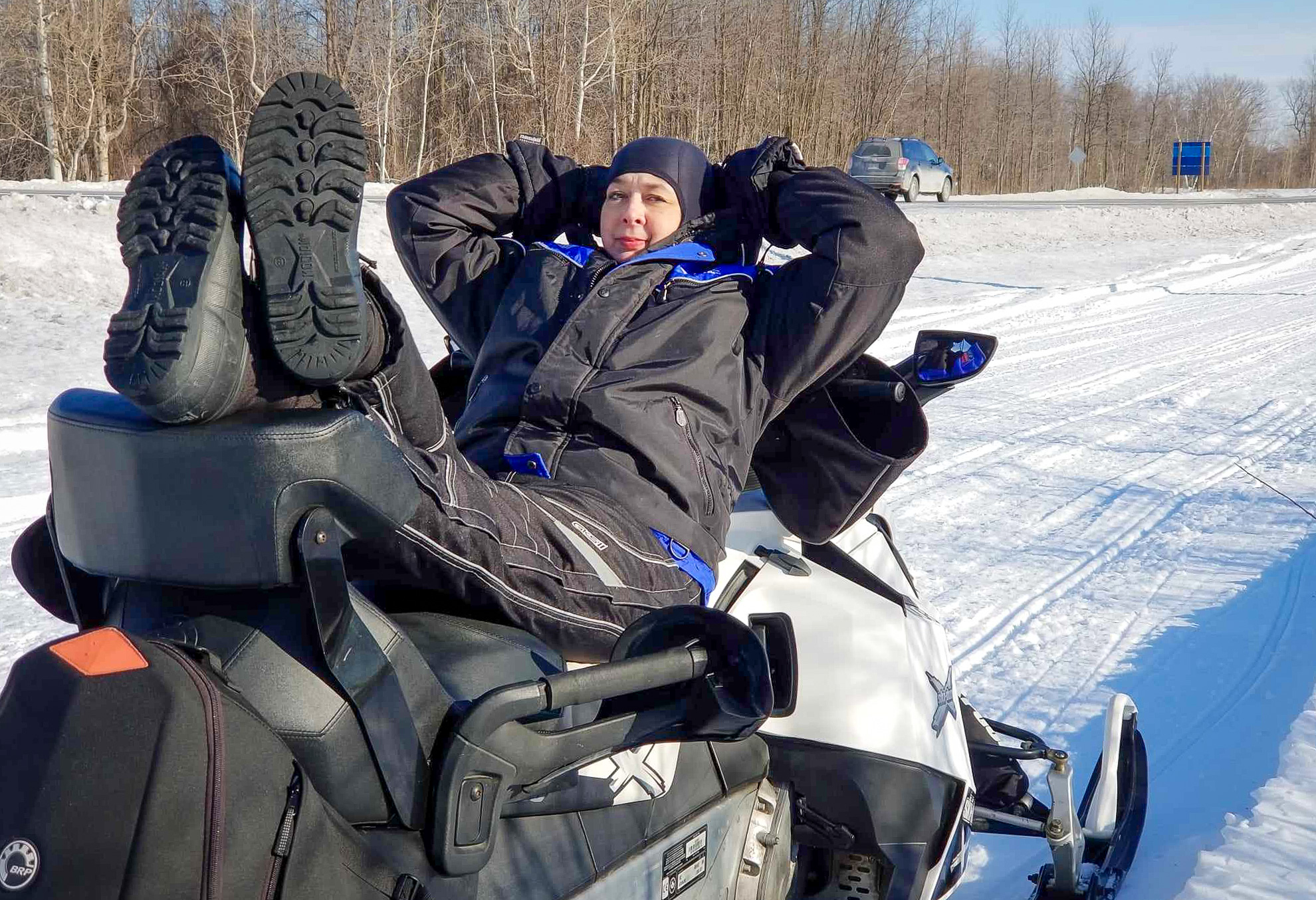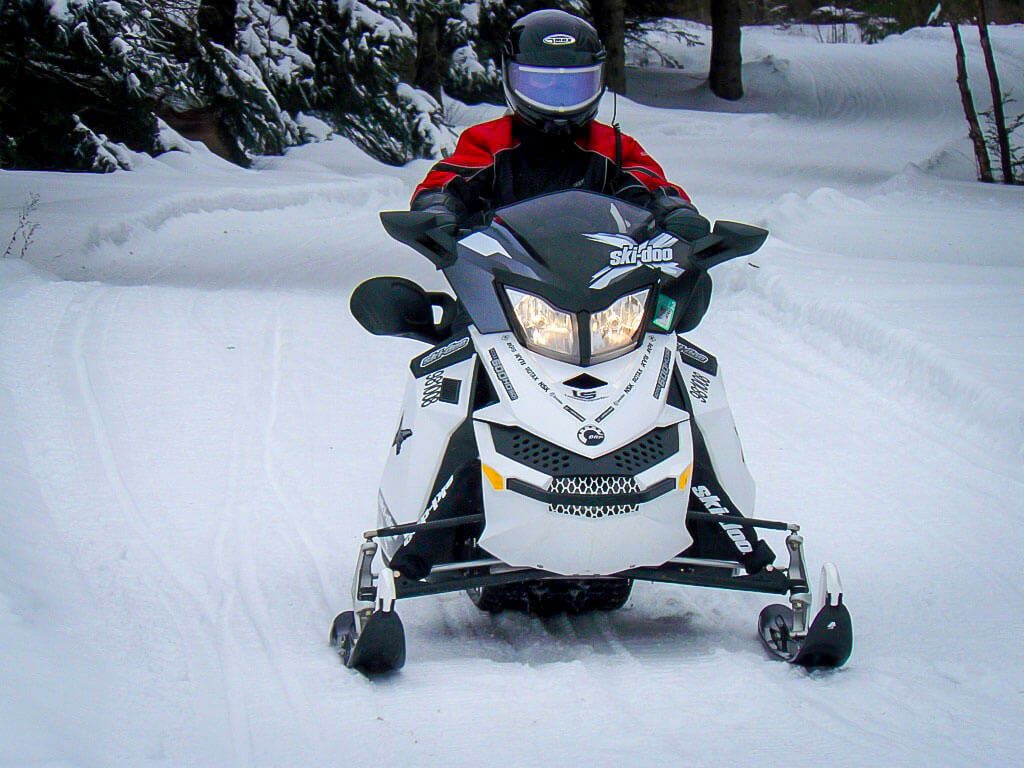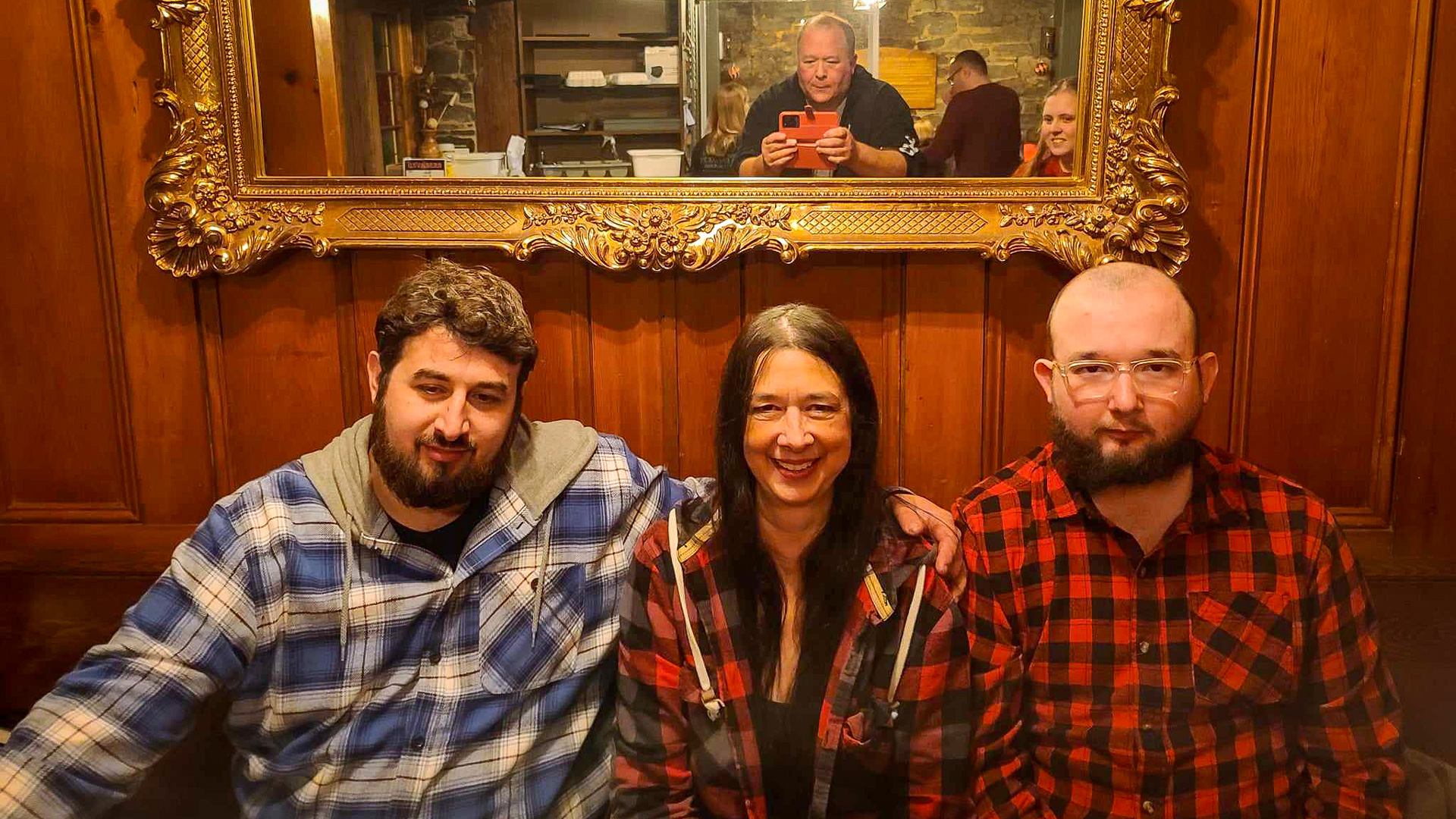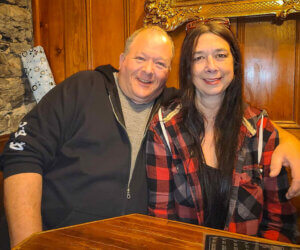Kimberley Melbourne struggled to read after 2009 traumatic brain injury
There was a time in Kimberley Melbourne's (Bachelor of Professional Arts, Human Services Major '24) life when she thought she missed her opportunity for a university degree.
As a teen, Melbourne had dreamed of pursuing a degree in psychology, but then life happened. She had kids at a young age and both her boys are on the autism spectrum. She worked full time, but so much of her focus went into ensuring her children had the life skills needed to succeed as adults. Before she realized it, she was 40 with very different priorities than in her youth.
"When you're a mom or a parent, you put that dynamic ahead of yourself a lot of the times," she explains.
It would take a freak snowmobiling accident and traumatic brain injury (TBI) for Melbourne to even consider investing time in herself. The injury left her unable to remember a phone number, read her handwriting, or relax with the fiction novels that she used to enjoy.
"It was very hard to concentrate, and very hard to focus on things that weren't real, like fiction," she recalls. "I just couldn't remember who was who in a book."
Instead of turning the page on her university dream, the Woodlawn, Ont., resident saw an opportunity for healing, and to learn new strategies to help her children reach their fullest potential.
"I decided that since I always wanted to get a degree, I might as well go to AU and fix my brain," Melbourne says.
Athabasca University (AU) made that dream possible. Learning accommodations and online courses at AU allowed her to continue working, raise a family, and rehabilitate from her injury.
Convocation on June 20 marks an important milestone in a 15-year journey of recovery and discovery. It's also the start of a new chapter and putting her education into practice to help other parents of children with autism.
"I've grown and developed more than I expected. I've become an adult—an educated adult—with less anxiety, and less nervousness about not understanding," she says.
Blasting through the snow
Like many winter-loving Canadians, Melbourne is passionate about snowmobiling. Some of her fondest memories as a teen near Ottawa were on the back of a snowmobile. Every Monday was "spaghetti dinner night," a local tradition where she and her boyfriend would blast through the snow and cold on their sled and warm up at a local restaurant with a steaming plate of pasta.
As an adult, snowmobiling became a family outing. Not only did she enjoy being outdoors, it was the one sport that made her boys feel included. Sons Dalton and Drew were seven and three years old, respectively, when they first started riding their mini sleds.
"They were able to be part of the community but also be alone, which is where their comfort zone is," Melbourne explains.
In fact, she joined a local snowmobiling club—and became president—just so the boys could ride without fear of bullying. "I was in it for my kids."


Black ice and brain fog
The afternoon of Feb. 7, 2009, began like so many family snowmobiling adventures. Melbourne and her husband, Dave, were out on a poker run, a tournament where riders stop at various checkpoints to get poker cards stamped. They sped along a familiar trail in the countryside near Carlsbad Springs on their way to dinner. Melbourne slowed for a stop sign at a T-intersection when her sled hit black ice.
She was only going 10 kilometres an hour, but the back of her sled slid sideways and she toppled. "Dave told me that I just fell over and landed on the back of my head."
To this day, Melbourne calls her accident "the most boring thing," and initially she thought she was OK. When Dave started to speak to her, he realized something was off and called 911.
"When I asked her about her kids, she didn't know that she had kids," he says. "I was scared that something was really wrong with her."
At the hospital, the doctor asked her to repeat his words to see if she could remember. She can recall his green scrubs, but not the conversation. To this day, she has no memory of the 24 hours before or after the accident.
It would be a full week before she regained her long-term memory, but nothing was like before. Self-employed as an online educator who taught health professionals to go paperless, Melbourne struggled to log into the system at work because she couldn't repeat the nine-digit code.
"I literally couldn't function. I couldn't remember how to say the numbers."
After a week of doing little more than lying on the couch, Melbourne went back to work—though she was far from recovered. It would be another 18 long months before she was referred to an outpatient brain injury clinic in Ottawa and began rehabilitation.
"I think my saviour was because I was stubborn, because I needed to earn income. I couldn't just sit around."
Parenting and life lessons
As a mother of autistic children, if there was one thing Melbourne knew, it was how to adapt. She had to learn how to best support her children's needs, including when to step in when supports weren't available.
When Dalton was about nine years old, he was bullied every day while taking the bus to school. Melbourne called the school. She called the bus contractor. She asked other parents for help. Nothing worked.
"The only thing I could think of was to become the damn bus driver to see what I'm missing."
That's exactly what she did. Melbourne switched careers to drive a school bus so that Dalton could get to school in peace. Over the years, she stepped in frequently to "rewrite the rules" to ensure her kids had the life skills they needed as adults.
"Learning didn't just happen in school."
As much as her brain injury was motivation for going to back to school, Melbourne felt she had maxed out on supports available for her boys, now in their teens, and she was at her limits. Four years after her accident, she enrolled in AU's psychology program to learn new strategies for supporting her kids.

Finding a home in human services
Though she enjoyed her studies in psychology, Melbourne was concerned about the amount of time required to complete her degree. She was 44 and felt like time wasn't in her favour.
"I'll be 65 before I graduate, and I have other plans," she remembers thinking.
Melbourne contacted AU's Registrar's Office for help and soon discovered a new direction that she credits to her efforts helping others. All the work she had done in her various careers as an online educator and in women's health care before gave her valuable experience in human services-a field she didn't even realize existed.
"I told [the advisor] everything I had done over the last 15 years and she's like, you're working in human services already. You're a practitioner."
Thanks to AU's Prior Learning Assessment and Recognition and her hard work, she earned 100% of the 30 credits possible towards her degree. She also worked with Accessibility Services to qualify for learning accommodations such as extra time for exams and being allowed to use spell check due to her TBI.
Study schedules and learning your limits
Even with learning accommodations, there were no shortcuts to success. Melbourne continued to work and focus on helping her children, but she dedicated one day per weekend to school, studying eight to 12 hours at a stretch.
When she was ready to start a course, Melbourne prepared folders and documents in advance. She even created lists of questions for her professors—ready to send on the first day of studies. When she ran into challenges, she asked for help. When she completed a course, she always took a five- to six-week break before starting the next one.
"I'm hyper-organized; because of my brain injury, I have to be," she says.
Even with a strict schedule and routine, there were highs and lows-and more than a few tears as Melbourne struggled with her disability. One of the most important lessons she learned at AU, and as a parent, was to separate emotion from her physical capabilities and limitations.
"Do I get upset with myself? No, I learned that I'm human just like everybody else."
Success and supporting parents of children with autism
After 11 years of study, Melbourne's decades-long dream of a university degree has finally come true. Dave says he's proud of what his wife has accomplished and how far she's come.
"She's an amazing woman and I am so proud of her," he says. "This has made her a stronger person and she has re-wired her brain. The sky is the limit on what she's capable of doing."
 Now, at age 55, she's planning one more career pivot. Just as she did at AU through PLAR, she's pulling together all the threads of knowledge and experience she's gained in her careers, and as a mother, a learner, and now a human services practitioner.
Now, at age 55, she's planning one more career pivot. Just as she did at AU through PLAR, she's pulling together all the threads of knowledge and experience she's gained in her careers, and as a mother, a learner, and now a human services practitioner.
She recently started her own business, Family Learning for Autism, to help other parents of autistic children develop strategies to help their kids succeed. A recent cancer diagnosis has added uncertainty about the long-term future, but it hasn't clouded her focus on helping others.
"Human services teaches people to think—specifically and with conviction—about what each person needs and why."
Though Melbourne's brain injury forever altered her life, in a way the accident was the turning point in her self-discovery. Being a parent of children with autism changes the whole family dynamic and family priorities, and she says it's unlikely she would have made herself and her education a priority otherwise.
"Putting yourself last sometimes is detrimental to your family. Just like everybody needs to exercise their body to stay in shape, it's the same thing for your mind. You need to grow your knowledge and your mind, and you need to learn every day."